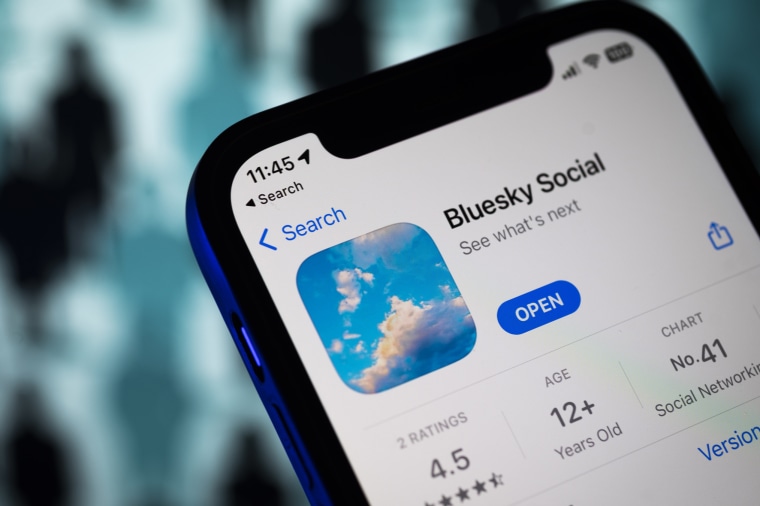Bluesky is the internet's buzziest social media platform — but you need an invite to get a look at it.
The decentralized Twitter clone is in beta, and invites are scarce. Twitter is full of people asking others for Bluesky access codes to avoid being put on a waitlist.
It's become the latest platform to be described as a potential Twitter replacement for some following Elon Musk’s takeover of the social media app.
While Bluesky's beta was made public in February, buzz surrounding the platform grew in April as more Twitter users began posting about flocking there. As of Friday, politicians such as Rep. Alexandria Ocasio-Cortez, D-N.Y., and celebrities such as Chrissy Teigen had joined the platform.
Here's what to know about the platform some are describing as the next Twitter.
When did it launch?
The idea for Bluesky originated at Twitter in 2019, but it became its own public benefit company in 2022 — with backing from former Twitter CEO Jack Dorsey.
Dorsey, who co-founded Twitter in 2006 and stepped down as chief executive in 2021, now serves on the board for Bluesky. The platform clarified its relationship to Twitter in a lengthy thread in April 2022, where it noted that former Twitter software engineer Jay Graber was also brought on to help launch the new platform.
Although the Bluesky app has many similarities to Twitter, its key difference is that it is organized around a decentralized system. That means user data can be stored on independent servers rather than ones owned by the company, and that in the future, users will be able to develop their own servers that they can use with communities of their choosing.
“People have been saying for years that it would be great if users could own their data and their relationships; if we could have transparent algorithms and algorithmic choice; if there could be more accountability and user control over how social platforms are moderated,” Graber wrote in a blog post last month. “We’ve now designed and built a system that we think achieves the goals stated above.”
The platform allows users to post text and images to a central feed, follow other users, and repost (similar to a retweet). The look and feel is nearly identical to Twitter, and people’s feeds are already filled with memes and jokes. Users do not have the ability to direct message each other or block others — at least not yet.
Posts, or “skeets” as some have taken to calling them on Bluesky, are limited to 300 characters. There are currently no video capabilities, but users can post images.
How can you sign up?
At the moment, the best way to get on Bluesky is to beg.
Bluesky began letting people off its waitlist this year and has been rolling out invites in waves.
The difficulty getting onto the platform has led to a host of half-joking memes from those hoping to snag an invite code. One person even claimed to sell Bluesky invite codes for more than $190 on eBay.
Bluesky has yet to announce a date for widespread public release.
In her March blog post, Graber wrote that the platform is working to "finish pieces that we believe to be critical," such as its content moderation system.
So, who is on it?
The Bluesky app racked up 375,000 downloads on iOS worldwide as of Wednesday, according to analytics firm Data.ai. The app was recently released on Android, but data for Android downloads hadn’t been collected as of Friday.
The site is predominantly populated by journalists, internet personalities, tech experts and some celebrities. Ocasio-Cortez and Teigen appear to be the most high-profile names on the platform so far.
Jordan Uhl, a progressive activist with more than 271,000 followers on Twitter, joined Bluesky on April 14. He said the app feels like it has the potential to be the first true alternative to Twitter.
“There’s just been this huge influx of people who are fed up with the way Twitter is going and haven’t found a viable alternative, and it seems like this is what they think could be the next Twitter,” he said.
However, there is still no verification process on Bluesky, which means impersonators have already begun cropping up. As of Friday, troll accounts impersonating author J.K. Rowling and Twitter owner Elon Musk have appeared on the platform.
Why has it seemingly become so popular already?
Since Musk acquired Twitter, the social media platform has been plagued with glitches, bugs and sweeping changes. Most recently, Twitter removed legacy verification, prompting more departures. And as Twitter becomes more chaotic, users have sought a new platform.
Last year, many said they were opting to join sites like Mastodon, a decentralized microblogging platform; Post.news; Substack Notes; and other Twitter alternatives. But some, like Mastodon, have been deemed too complicated to navigate because of the server-based nature.
Bluesky's currently exclusive nature has also proved to be in its favor. On Sunday, the platform became a trending term on Twitter.
With a limited amount of people on the platform, Bluesky has seemingly yet to be infiltrated by conspiracy theorists.
That may change in the future. Bluesky will potentially open up the app once it has a more robust moderation system in place, Graber wrote in her blog.
"We want to enable people to have a safe, enjoyable experience, so we’re regulating growth and building moderation tooling as a first-order feature and not as an afterthought," she said.

